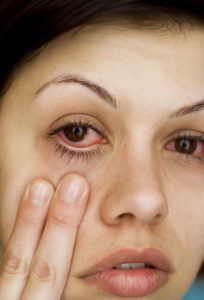March 04, 2022 | Black & Kletz Allergy
It is March again, and this marks the start of Spring. In the Washington, DC, Northern Virginia, and Maryland metropolitan area, trees are pollinating in the month of March. The pollination of trees is a major trigger for many allergy sufferers as it may cause either allergic rhinitis (i.e., hay fever) symptoms, allergic conjunctivitis (i.e., eye allergies) symptoms, or both to occur simultaneously. The classic symptoms of allergic rhinitis may include sneezing, runny nose, nasal congestion, post-nasal drip, itchy nose, itchy throat, sinus congestion, sinus headaches, and/or snoring. The typical symptoms of allergic conjunctivitis may include itchy eyes, watery eyes, redness of the eyes, thick sticky discharge of the eyes, puffy eyelids, and/or eyelids sticking together especially in the mornings when awakening. Even though the likely candidate for an increase in ocular or nasal allergy symptoms in the month of March is likely to be the tree pollen, one cannot rule out other allergies such as allergies to molds, dust mites, pets, and/or cockroaches.
Allergic conjunctivitis is often categorized into 2 types:
- Seasonal allergic conjunctivitis – Associated with seasonal allergies mostly common in the Spring or Fall. Tree and grass pollens are usually responsible for Spring symptoms whereas weeds are usually responsible for symptoms in the Fall.
- Perennial allergic conjunctivitis – Associated with year-round allergies such as allergies to dust mites, molds, pets, and/or cockroaches.
Most allergic individuals who have allergic conjunctivitis also have allergic rhinitis at least to some extent. Some allergic individuals who have allergic conjunctivitis and/or allergic rhinitis also have asthma and/or eczema (atopic dermatitis). Asthma triggered by environmental allergens such as dust mites, molds, pollens, pets, and cockroach is essentially a continuation of the allergies past the nose and throat into the lower respiratory system. Individuals with asthma may experience wheezing, shortness of breath, chest tightness, and/or coughing. Asthmatics and individuals with eczema may also have concomitant allergic rhinitis, allergic conjunctivitis, or both.
Allergic conjunctivitis is usually diagnosed by board certified allergists, such as the ones at Black & Kletz Allergy, by way of a comprehensive history and physical examination. The individual is usually allergy tested by skin testing or blood testing in order to determine the offending allergens that are causing the symptoms of allergic conjunctivitis (i.e., itchy eyes, watery eyes, redness of the eyes, puffy eyelids, eyelids sticking together). Once the allergens are identified, it is advisable to try to avoid them if at all possible. Below are several recommendations on measures to help avoid allergens that may contribute to allergic conjunctivitis:
- Close the windows of one’s cars and house.
- Follow the local pollen count at www.bkallergy.com by clicking Today’s Pollen Count.
- Change one’s clothes and shower after spending a long time outdoors.
- Leave one’s shoes outdoors after being outside.
- Wash hair/fur of one’s pet after it comes inside from outdoors.
- Go outside after it rains since the pollen count is “washed away” temporarily.
- Use antihistamines and/or nasal sprays early in the pollen season.
- Consider allergy shots (see below) if more persistent or severe symptoms to pollens or molds occur, since they are effective in 80-85% of individuals with allergic rhinitis and/or allergic conjunctivitis.
On many occasions it is difficult, if not impossible, to avoid the allergens, so medications are prescribed. These medications may include allergy eye drops and/or oral antihistamines. Since it is quite common for individuals with allergic conjunctivitis to also have associated nasal symptoms (i.e., allergic rhinitis), many will also receive prescriptions for nasal sprays, oral leukotriene antagonists, and/or oral decongestants. Allergy shots (i.e., allergy immunotherapy, allergy injections, allergy desensitization, allergy hyposensitization) are very effective in the treatment of allergic conjunctivitis, allergic rhinitis, and asthma as they work in 80-85% of the patients that take them. Allergy shots have been given to treat allergies for more than 100 years. They are given to individuals of all ages, from small children to the elderly. The average length of time that one undergoes allergy immunotherapy treatment is typically from 3-5 years.
It is also important for the allergist to rule out other causes of “pink” or red eyes when someone presents with redness of the eyes. Infections of the eyes (i.e., viral, bacterial, fungal, parasitic), chemical irritants, pollutants, foreign body, anterior uveitis, subconjunctival hemorrhage, and blood thinning medications can all cause “pink” or red eyes.
The board certified allergy specialists at Black & Kletz Allergy have been diagnosing and treating both adults and children with eye allergies. Black & Kletz Allergy has 3 convenient locations in the Washington, DC, Northern Virginia, and Maryland metropolitan area. We have offices in Washington, DC, McLean, VA (Tysons Corner, VA), and Manassas, VA which all offer on-site parking. The Washington, DC and McLean, VA locations are Metro accessible and there is a free shuttle that runs between the McLean, VA office and the Spring Hill metro station on the silver line. Please call us to make an appointment or you can click Request an Appointment and we will reply within 24 hours by the next business day. The allergy doctors of Black & Kletz Allergy are eager to help you with your allergy, asthma, sinus, and immunology needs. We are dedicated to providing excellent care and service to you as we have been doing in the Washington, DC metro area for more than 50 years.













